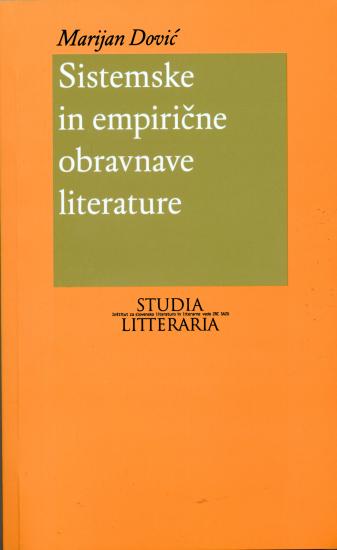
Author:
Marijan Dović
Year:
2004
The monograph discusses systemic and empirical approaches to literature, which as a rule, appeared as a response to the crisis in literary criticism of the 1980-ies and 1990-ies – mainly in Germany, France, the Netherlands, Canada and the USA. It depicts their main traits in a concise and comprehensible manner, in order to clarify how and why they move away or fence from what could be called traditional literary criticism, pointing out the correlations between individual trends that modern literary criticism describes as “empirical” and “systemic”, as well as outlining their points of convergence and divergence.
Looking at the contemporary systemic and empirical approaches as a whole, four theoretical trends seem to prevail. By far the most prominent among them is Siegfried J. Schmidt's empirical science of literature (ESL) receiving the greatest amount of attention accordingly, however, close attention is also paid to the systems theory (Niklas Luhmann), the theory of the literary field (“champ littéraire” – Pierre Bourdieu) and the polysystems theory (Itamar Even-Zohar). The book covers and describes all the relative aspects of these trends, as well as their theoretical foundations; primarily radical constructivism, which represents a real paradigmatic shift within the cognitive sciences (Maturana, Varela, von Glasersfeld), and the general theory of social systems (Luhmann). When necessary, already the introductions of individual trends point to their weaknesses, as well as correlations to other approaches. The most critical issues arising in relation to the new approaches to hermeneutics, or the tradition of interpretation, to past comprehension of empiricism, and to the tradition of (sociological) empiricism and positivism, are systematically dealt with in the comprehensive closing segment of the book.
The basic hypothesis, derived mainly from the writing of the founder of the empirical science of literature Siegfried J. Schmidt, which states that the new systems and empirical approaches to literature “wipe out” the old conceptions of positivist empiricism and sociology, is in the end only partially confirmed. The old concepts are mainly or even exclusively overcome only when they are included in the new meta-theoretical basis, that is, in radical constructivism. A lot of what is far from new in literary criticism, and is considered long surpassed, is therefore still retained under the name of “systemic and empirical approaches to literature”.
The central part of this comprehensible study, which is mainly theoretical, is indeed a systematic introduction of systemic and empirical approaches to literature. However, their findings are continually commented upon and verified, and the trends are placed within the context of other traditional and contemporary paradigms of literary criticism and are also critically assessed. In order for the book to go at least in part beyond the limits of a “theoretical overview”, the author in the end provides suggestions as to how the methods and findings of the new approaches could be usefully applied to Slovenian literary history material.
-
Author
-
Publishing House:
Založba ZRC
-
Publisher
-
ISBN
961-6500-57-0
-
Year
2004
-
Series
Language(s)
-
Specifications
paperback 13 × 21 cm 238 pages
-
E-publications
-
Permalink